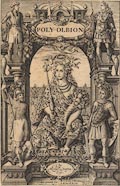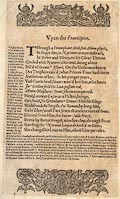
|

|

|
|
|
|
|

|
title page |
|
|
|
|
|
Frontispiece:-

and facing the 'frontispiece':-

Upon the Frontispice.
|
frontispiece
England
|
|
|
THrough a Triumphant Arch, see Albion
plas't,
In Happy site, in Neptunes armes embras't,
In Power and Plenty, on his Cleevy
Throne
Circled with Natures Garlands, being alone
Stil'd th'Oceans [star] Island. On the
Columnes beene
(As Trophies raiz'd) what Princes Time hath seene
Ambitious of her. In hir younger years,
Vast Earth-bred Giants woo'd her: but, who bears
In [a] Golden field the Lion passant red,
AEneas Nephew (Brute) them conquered.
Next, Laureat Caesar, as a Philtre, brings,
On's shield, his Grandame [b] Venus: Him hir
Kings
Withstood. At length, the Roman, by long sute,
Gain'd here (most Part) from th'ancient race of
Brute.
Divors't from Him, the Saxon [c] sable
Horse,
Borne of sterne Hengist, wins her: but, through
force
Garding the [d] Norman Leopards bath'd in Gules,
She chang'd hir Love to Him, whose Line yet rules.
|
|
|
|
|
|
|
|
|
[star] Insula Caeruli.
|
|
|
[a] So Ha[m]illan & Upton anciently delivered. I
justifie it not; yet, as well as others can his other
attributed Arms, I might.
|
|
|
[b] Object not, that it should be the Eagle, because
it is now borne by the Emperors; and that some Heralds
ignoranty publish it, as J. Caesars Coat, Double
headed. They move me not; for plainly the Eagle
was single at that time (unless you call it [ ... Greek ...]
as Pindar doth Joves Eagle) and but newly us'd among
the Romans (first by Marius) as their
Standard, not otherwise, untill afterwards
Constantine made it respect the two Empires: and
since, it hath beene borne on a Shield. I took Venus
proper to him, for that the stamp of hir face (she being his
Ancestor AEneas his mother) in his Coins is frequent;
and can so maintaine it here fitter, then many of those
invented Coats (without colour of reason) attributed to the
old Heroes. As for matter of Armory, Venus being a
Goddesse may be as good Bearing, if not better than
Atlanta, which, by expresse Authority of
Euripides, was borne, in the Theban warre by
Partheo[ ].
|
|
|
[c] Hengist hath other Armes in some traditions,
which are to be respected as Old wives fictions. His name
expresses a Horse, and the Dukes of Saxony are
said to have borne it anciently, before their Christianity,
Sable: therfore, if you give him any, with most reason, let
him have this.
|
|
|
[d] The common Blazon of the Norman Armes justifies
it. And, if you please, see for it to the XI. Canto.
|
|
|
|

|
title page |
|
|
|
|
|
|
|
|
|







 Drayton 1622, frontispiece
Drayton 1622, frontispiece